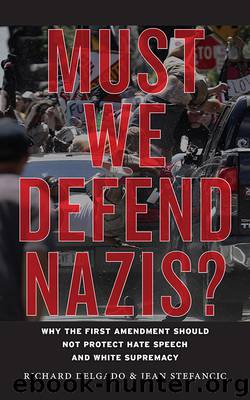Must We Defend Nazis?: Why the First Amendment Should Not Protect Hate Speech and White Supremacy by Jean Stefancic & Richard Delgado

Author:Jean Stefancic & Richard Delgado
Language: eng
Format: epub
Tags: LAW000000 Law / General, Constitutional, Civil Rights, Law, Political Science
Publisher: NYU Press
Published: 2018-01-31T01:03:53.486000+00:00
The Quixotic Argument
Neoconservatives also argue against hate-speech regulation on the ground that the effort is doomed or quixotic. White people will never accede to such rules. Proponents of hate-speech regulation surely must know this, hence their objectives are probably symbolic, tactical, or at any rate something other than what they say. Donald Lively, for example, writes that the U.S. Supreme Court has consistently rejected laws regulating speech, finding them vague and overbroad. He also writes that the anti-hate-speech campaign lacks vision and a sense of marketability—it simply cannot be sold to the American public. Henry Louis Gates demands to know how hate-speech activists can possibly believe that campus regulations will do much good even if enacted. If campuses are the seething arenas of racism that activists believe, how will campus administrators and hearing officials provide nondiscriminatory hearings on charges brought under the codes?
But is the effort to curb hate speech doomed or misguided? It might be seen this way if the gains to be reaped were potentially only slight. But, as we argued earlier, they are large; indeed our entire panoply of civil rights laws and rules depends for its efficacy on controlling the background of harmful depiction against which the rules and practices operate. In a society where minorities are thought and spoken of respectfully, few acts of out-and-out discrimination would take place. In one that harries and demeans them at every turn, even a determined judiciary will not be able to enforce equality and racial justice.
Moreover, success is more possible than toughlove adherents would like to acknowledge. A host of Western industrialized democracies have instituted laws against hate speech and hate crime, often in the face of initial resistance (see chapter 6). Some, like Canada, Great Britain, and Sweden, have traditions of respect for free speech and inquiry rivaling ours. Determined advocacy might well accomplish the same here. In recent years, several hundred college campuses have seen fit to institute student conduct codes penalizing face-to-face insults of an ethnic or similar nature, in order to advance interests that they considered central to their function, such as protecting diversity or providing an environment conducive to education.
In addition, powerful actors like government agencies, the writers’ lobby, industries, and so on have generally been quite successful at coining free-speech exceptions to suit their interest—exceptions like libel laws, defamation, false advertising, copyright, plagiarism, words of threat, and words of monopoly, just to name a few. Each of these seems natural and justified—because time-honored—and perhaps each is. But the magnitude of the interest underlying these exceptions seems no less than that of a young black undergraduate subject to hateful abuse while walking late at night on campus. New regulation is of course subject to searching scrutiny in our laissez-faire age. But the history of free-speech doctrine, especially the landscape of exceptions, shows that need and policy have a way of being translated into law. The same may happen with hate speech.
Download
This site does not store any files on its server. We only index and link to content provided by other sites. Please contact the content providers to delete copyright contents if any and email us, we'll remove relevant links or contents immediately.
Conversations with RBG by Jeffrey Rosen(751)
Genetics by Unknown(740)
The Tyranny of Good Intentions by Paul Craig Roberts(676)
Journalism by Michael Schudson(588)
Critical Race Theory by Richard Delgado & Jean Stefancic & Angela Harris(549)
Losing the News by Jones Alex(545)
The Permission Society by Timothy Sandefur(522)
Active Liberty by Stephen Breyer(518)
Talking Back to the Indian Act by Mary-Ellen Kelm(517)
Supreme Power by Ted Stewart(516)
American Studies by Deloria Philip J(507)
The Jury in America by Dennis Hale(503)
The Federalist papers by Alexander Hamilton; James Madison; John Jay; Lawrence Goldman(500)
Information Privacy Law by Daniel J. Solove Paul M. Schwartz(490)
A Case for the American People by Norman Eisen(484)
The Conscience of the Constitution: The Declaration of Independence and the Right to Liberty Hardcover by Timothy Sandefur(479)
We the People by Sachs Albie(469)
The Constitutional Convention by James Madison(465)
Supreme Inequality by Adam Cohen(463)
